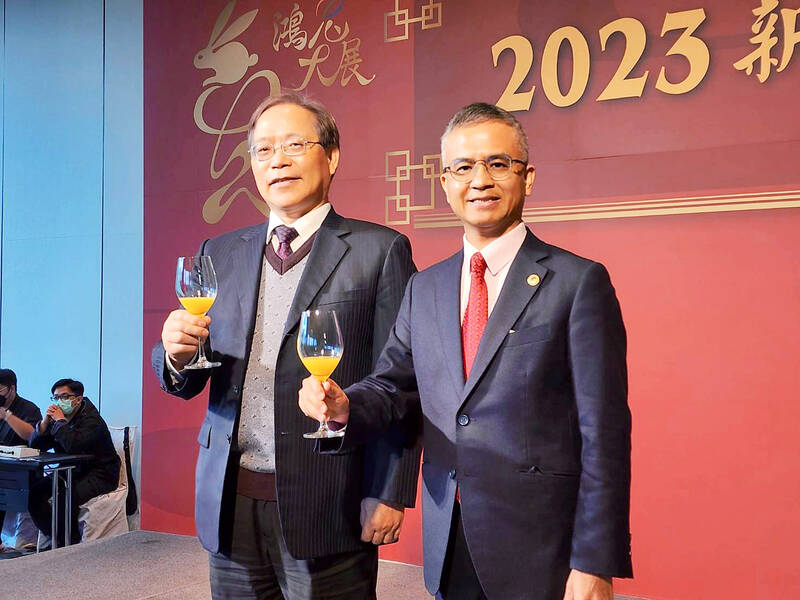Chunghwa Telecom Co (中華電信) aims to boost its 5G penetration rate by 10 percentage points to about 35 percent this year, amid demand from government agencies and enterprise clients for high-speed Internet connections and private networks, the company said yesterday.
Chunghwa, the nation’s biggest telecom, had accumulated 2.45 million 5G subscribers as of the end of last year, accounting for about 25 percent of its overall mobile users, data compiled by the National Communications Commission showed.
“We expect 5G subscription to grow at a similar pace as last year,” Chunghwa Telecom chairman Sheih Chi-mau (謝繼茂) told a news conference in Taipei.

Photo: CNA
Chunghwa Telecom said that government agencies and industrial users are the early adopters of 5G networks, followed by individual subscribers, which is starkly different from the uptake of 4G.
It has made good progress in helping enterprise clients build private 5G networks, obtaining 90 percent of the deals among the nation’s large-scale enterprises, it said.
Local telecoms would likely be disciplined on pricing strategy, as it would take longer to break even on 5G services compared with 4G, given the heavy infrastructure deployment and investment, Sheih said.
The companies spent 10 years making 4G services a profitable business, he said.
To stimulate 5G adoption and to satisfy demand for emerging applications, Chunghwa Telecom said it plans to add 1,700 workers this year, with 41 percent of the initial hires focused on artificial intelligence, cloud services, cybersecurity and data services.
To attract and retain talent, it is raising the starting salary for entry-level jobs to NT$40,000 (US$1,324), from about NT$37,000, it said.
Increases in human resource expenses are to eliminate about NT$0.05 from the company’s earnings per share a year, it said.
The company also set a mid-term goal of boosting revenue from three rapidly growing businesses — cloud-based services, cybersecurity and 5G-based artificial intelligence of things — to reach NT$10 billion each by 2025.

Chizuko Kimura has become the first female sushi chef in the world to win a Michelin star, fulfilling a promise she made to her dying husband to continue his legacy. The 54-year-old Japanese chef regained the Michelin star her late husband, Shunei Kimura, won three years ago for their Sushi Shunei restaurant in Paris. For Shunei Kimura, the star was a dream come true. However, the joy was short-lived. He died from cancer just three months later in June 2022. He was 65. The following year, the restaurant in the heart of Montmartre lost its star rating. Chizuko Kimura insisted that the new star is still down

While China’s leaders use their economic and political might to fight US President Donald Trump’s trade war “to the end,” its army of social media soldiers are embarking on a more humorous campaign online. Trump’s tariff blitz has seen Washington and Beijing impose eye-watering duties on imports from the other, fanning a standoff between the economic superpowers that has sparked global recession fears and sent markets into a tailspin. Trump says his policy is a response to years of being “ripped off” by other countries and aims to bring manufacturing to the US, forcing companies to employ US workers. However, China’s online warriors

Application-specific integrated circuit designer Faraday Technology Corp (智原) yesterday said that although revenue this quarter would decline 30 percent from last quarter, it retained its full-year forecast of revenue growth of 100 percent. The company attributed the quarterly drop to a slowdown in customers’ production of chips using Faraday’s advanced packaging technology. The company is still confident about its revenue growth this year, given its strong “design-win” — or the projects it won to help customers design their chips, Faraday president Steve Wang (王國雍) told an online earnings conference. “The design-win this year is better than we expected. We believe we will win

Intel Corp chief executive officer Lip-Bu Tan (陳立武) is expected to meet with Taiwanese suppliers next month in conjunction with the opening of the Computex Taipei trade show, supply chain sources said on Monday. The visit, the first for Tan to Taiwan since assuming his new post last month, would be aimed at enhancing Intel’s ties with suppliers in Taiwan as he attempts to help turn around the struggling US chipmaker, the sources said. Tan is to hold a banquet to celebrate Intel’s 40-year presence in Taiwan before Computex opens on May 20 and invite dozens of Taiwanese suppliers to exchange views